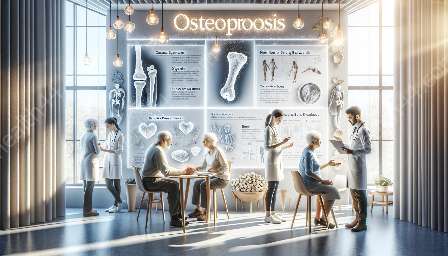Osteoporosis is a condition characterized by weakened bones, making them fragile and more prone to fractures. Nutrition plays a vital role in maintaining bone health and preventing the onset or progression of osteoporosis. This comprehensive guide explores the intricate connection between nutritional factors and osteoporosis and highlights the significance of a balanced diet, supplemented with key nutrients, in promoting optimal bone density and overall health.
Understanding Osteoporosis
Osteoporosis is a serious health concern, particularly for aging individuals and postmenopausal women. The condition leads to a decrease in bone density and quality, resulting in an increased risk of fractures, especially in the hip, spine, and wrist. While osteoporosis is influenced by various factors such as genetics, hormonal changes, and physical activity, nutrition also plays a crucial role in bone health.
Key Nutritional Factors for Bone Health
Several nutritional factors are closely linked to the development and progression of osteoporosis. These include:
- Calcium: A vital mineral that provides the structural framework for bones and teeth, calcium is essential for maintaining bone density and strength. Inadequate calcium intake can lead to an increased risk of developing osteoporosis.
- Vitamin D: Known for its role in calcium absorption, vitamin D is crucial for bone health. It helps regulate calcium and phosphorus levels in the body, promoting the mineralization of bones.
- Protein: Protein is a key component of bone tissue and plays a role in bone remodeling and repair. Adequate protein intake is necessary for maintaining bone mass and strength.
- Magnesium: This mineral is involved in bone formation and influences the activity of osteoblasts and osteoclasts, the cells responsible for building and breaking down bone tissue.
- Vitamin K: Vitamin K contributes to bone health by promoting the synthesis of proteins involved in bone mineralization and reducing the risk of fractures.
- Phosphorus: Working in tandem with calcium, phosphorus is essential for bone mineralization and maintaining bone structure.
- Other Micronutrients: Nutrients such as vitamin C, vitamin A, and zinc also play roles in bone health, supporting collagen formation, immune function, and bone metabolism.
The Role of Diet in Osteoporosis Prevention
Adopting a balanced and varied diet that includes foods rich in the aforementioned nutrients is crucial for supporting bone health and preventing osteoporosis. Key dietary sources of these nutrients include:
- Calcium: Dairy products, leafy greens (e.g., kale, broccoli), fortified foods (e.g., orange juice, tofu), and almonds.
- Vitamin D: Fatty fish (e.g., salmon, mackerel), egg yolks, fortified foods (e.g., milk, cereal), and exposure to sunlight for natural vitamin D synthesis.
- Protein: Lean meats, poultry, fish, legumes, nuts, and dairy products.
- Magnesium: Nuts, seeds, whole grains, leafy greens, and certain legumes.
- Vitamin K: Leafy greens (e.g., spinach, kale), broccoli, brussels sprouts, and fermented dairy products.
- Phosphorus: Dairy products, meat, fish, poultry, whole grains, and nuts.
- Other Micronutrients: Fruits, vegetables, nuts, seeds, and a variety of whole foods.
While obtaining essential nutrients through a well-rounded diet is ideal, some individuals may require supplementation to meet their nutritional needs, especially if they have dietary restrictions or medical conditions that impact nutrient absorption.
Supplements for Bone Health
For individuals who may have difficulty obtaining sufficient nutrients from their diet alone, supplements can be beneficial in supporting bone health and reducing the risk of osteoporosis. Commonly recommended supplements include:
- Calcium Supplements: Available in various forms, including calcium carbonate and calcium citrate, these supplements can help individuals meet their daily calcium requirements. It's important to consider factors such as absorption, side effects, and potential interactions with other medications when selecting a calcium supplement.
- Vitamin D Supplements: Especially beneficial for individuals with limited sun exposure or inadequate dietary intake of vitamin D, supplements can help maintain optimal vitamin D levels in the body.
- Multivitamins and Mineral Supplements: These comprehensive supplements provide a range of essential nutrients, including those critical for bone health, such as magnesium, vitamin K, and phosphorus.
Physical Activity's Role in Bone Health
In addition to nutrition, physical activity is a key component of maintaining strong and healthy bones. Weight-bearing exercises, resistance training, and activities that promote balance and coordination contribute to bone strength and reduce the risk of fractures associated with osteoporosis. Combining a nutritious diet with regular physical activity is essential for optimizing bone health and overall well-being.
Conclusion
Nutritional factors significantly impact bone health and play a pivotal role in preventing and managing osteoporosis. By prioritizing a balanced diet rich in key nutrients, considering the potential need for supplements, and engaging in regular physical activity, individuals can support their bone density and reduce the risk of osteoporosis-related fractures. Taking proactive steps to address nutritional factors and maintain bone health is crucial for promoting a higher quality of life and overall health, especially as individuals age and face increased susceptibility to osteoporosis.


